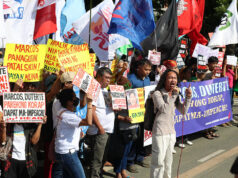Senate President Tito Sotto deserves the Best Actor Award for his melodramatic declaration that he was for “withdrawing” the Senate version of the 2019 national budget and for using the 2018 reenacted budget because he was “sick and tired” of allegations of massive pork barrel insertions made by members of Congress.
“I hope that will erase all doubts and allegations of pork and other so-called insertions in the budget,” Sotto was quoted by the media as saying.
We, the taxpaying, revenue-contributing citizens, are supposed to applaud Sotto for his seemingly self-sacrificing proposal — except for one small detail. The 2018 budget for the Philippine Senate of almost P6 billion is nearly P1.3 billion more than the proposed 2019 budget of P4.7 billion.
We always knew Sotto to be clever but he probably didn’t think this one through. Buko!
Of course, other interested parties in the government have objected to Sotto’s proposal, warning that it would adversely affect the forward economic thrust of the country. In truth, the objectors have a point. If the Philippines is supposed to catch up with its Asian neighbors, the government has to invest more substantially in infrastructure and in projects and programs essential to national development, particularly employment generation.
The nightmarish traffic situation in Metro Manila is one glaring proof of the infra-inadequacy of the country. In tourism development alone, more substantial investments are needed to address the issues affecting the country as listed in a World Bank study. Among these are inadequate infrastructure and largely invisible tourism promotions, both of which require increased appropriations.
At any rate, there should be no question about the need for a substantial national budget to address our country’s development needs, as well as funds to operate the national government. And if one looks at the numbers, this government has been relatively frugal in its budgeting, appropriating P3.757 trillion for 2019 or 19.3% of the year’s projected gross domestic product (GDP) compared to P3.767 trillion in 2018 or 21.6% of projected GDP.
The world has witnessed the spectacle of a national government finding itself without a duly approved budget. The United States federal government found itself facing a blank wall when President Donald Trump declared that he would not sign a budget for several key departments unless an allocation was made by the House of Representatives for his border wall (the one he promised his voter base that Mexico would pay for). Trump’s problem was (and continues to be) the fact that the newly-dominant Democrats in the House of Representatives, led by Speaker Nancy Pelosi, have stonewalled and flatly rejected Trump’s demand. The Republican-controlled Senate can do nothing. Thus a stalemate and no operating budget for the affected departments and no pay for their employees.
Trump eventually caved in and approved a short-term budget to reopen the government and facilitate negotiations. But the deadline is fast approaching and neither side has budged. So another shutdown looms.
At least, in the Philippine government system, last year’s budget is reenacted — or applied — if no budget for the new fiscal year is approved. So what’s the problem?
The problem is the political system, that’s what.
It is a system of patronage by which the citizens look to their elected officials, particularly the congressmen and senators, for public works and services, jobs, and handouts for KBL (kasal, binyag, libing) and for school tuition, as well as bribe money for their votes. The officials, in turn, get back their “investments” by raiding the national treasury, using some of the funds for the requisite public works and services, and the rest for buying votes, and most of the funds for lining their pockets.
Of course, they don’t use the garapal word “raid” but prefer the euphemism, Priority Development Assistance Fund. But the Supreme Court didn’t buy the euphemism, declaring the system of allocating “discretionary funds” unconstitutional. At any rate, everybody knows the system as pork or pork barrel – which brings up visions of pigs gorging themselves in the pig sty.
A less benign but more appropriate term is gang rape.
Who are the rapists? The members of Congress. Who are being raped? The citizenry. But in a demented system such as ours, many of the rape victims have been following the advice of a former senator and secretary of foreign affairs, namely, “If rape is inevitable, just lie back and enjoy it!”
Of course, the honorable senators and congressmen will vehemently deny this and will claim righteous indignation,
“We provide scholarships for indigent students,” some will protest. “Is that bad? Otherwise, where will we get the funds?”
“We have built roads and schoolhouses, playgrounds and plazas, irrigation systems and artesian wells for our constituents in the rural areas,” others will declare. “Is that wrong? Otherwise, our poor constituents will forever be neglected by the national government.”
And then, of course, there are those who adamantly declare that the “happy pork barrel days are over” as alleged by Senator Ping Lacson. In fact, House Majority Leader Rolando Andaya has guaranteed that the members of the Lower House will be “observant” of the Supreme Court’s decision declaring the pork barrel unconstitutional.
Maybe Congressman Andaya has a point. After all, aren’t these legislators supposed to present their development budgets for approval, thus avoiding any stink of “discretionary” spending? That’s not unconstitutional, is it ?
Yeah, yeah, respond the cynical tricycle drivers in my neighborhood in Parañaque. Sure there are projects. But what about the overpricing? And what about the kickbacks? And what about the Napolesation? Apparently, they haven’t forgotten the legendary Janet Napoles, the Queen of Pork. (Napoles was convicted of plunder by the Sandiganbayan last December. — Ed.)
“Ang kickback ngayon sa public works contract, 60%!” says one driver whose relative has landed provincial public works contracts.
The cynical tricycle drivers add, “Di nga nila tatawaging pork pero litson din – litsong manok.” Or sate babi. Or barbecue. Or kebab. But by any other name, it still is a way of roasting the citizens of the country over hot coals.
To quote Senator Lacson, “If it looks like pork, sounds like pork, and smells like pork, it must be pork!”
With due respect to Ping, I think gang rape is a more appropriate term.
Greg B. Macabenta is an advertising and communications man shuttling between San Francisco and Manila and providing unique insights on issues from both perspectives.
gregmacabenta@hotmail.com



